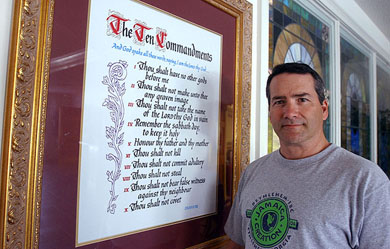As I mentioned before, the right-wing supergroup The Freedom Federation held a press conference yesterday to lay out its position on the healthcare reform debate. Their position? The current system “has problems” but “it is working.”
And look at how they explain just how well it is working:
[Harry] Jackson recounted his own diagnosis with esophageal cancer three years ago, and expressed gratitude to have had good insurance coverage.
“I was given about a 15 percent chance of living by the doctors, and at that time we had to choose where we were going to go, and so we were able to go to Johns Hopkins even though it was a little bit of a drive,” he said. “I thank God for the flexibility of . . .the program that we’re on concerning insurance.”
But Jackson explained that some of the treatments he needed were considered “experimental” – treatments he would not have qualified for nor received under proposed evidence-based medicine requirements in the health-care reform bill – a form of rationing.
“If I had waited just a few months to stand in line at a rationed health care process, I wouldn’t be alive,” Jackson said. “Many of my congregational members who needed transplants and other things are deeply gratified and thankful that the system so far has given excellent care to some of them.”
Compare that to what he wrote just a few weeks ago when he recounted the insurance nightmare and massive out-of-pocket expenses he faced as a result of his cancer:
After that initial prognosis, we had a constant tug of war between my family and the insurance company. The insurance company dictated the location of my tests and their costs. This did not seem overbearing until my first chemo treatments were called “experimental” and nearly $10,000 of expenses were racked up in less than two weeks by various additional, preliminary procedures.
It seemed to us that during the first month of my treatment, more hours were spent working on the nuances of the insurance puzzle than actually treating me. My problem was that postponement or denial of treatment meant possible death. I, like thousands of others, could not have survived a six-month delay of the special care Hopkins offered. In fact, if I had been treated at a different local hospital, I would probably not be writing this article. I would not have died from cancer, but of a lack of timely medical attention.
…
Today, I am cancer free and am expecting to live a long and meaningful life. The cost of this new lease on life was approximately $100,000 of unexpected personal costs beyond traditional medical costs. The out-of-pocket costs for special food, clothing and preventive health treatments were huge. These numbers also don’t begin to reflect the loss of both opportunity and income that the disease inflicted upon my family.
So, Jackson had to fight tooth-and-nail to get his insurance to cover the treatment he needed to survive and racked up “$100,000 of unexpected personal costs beyond traditional medical costs” …. and he uses this experience to argue that we don’t need to reform the healthcare system?
Or take this other example from the Freedom Federation press conference:
[Rick Tyler, the founding director of Renewing American Freedom] explained that under his co-pay agreement with his insurance company, his cholesterol-reducer Lipitor cost him just $15 dollars a month, but decided to “walk the walk” and get a Health Savings Account, one of the proposed free-market health care solutions.
After the cost of his prescription skyrocketed to $139.10, Tyler said he did some research and found he could get a similar statin drug, Zocor, for just $40, if his doctor switched him.
“Since then, I’ve actually switched to Prevastatin, which is available at Wal-Mart for $4 a month,” he said. “Now how does that happen? That happened because I had access to information and consultation with my doctor. All that money I saved, which is a thousand dollars a year, now stays in my health savings account.”
So under his insurance policy, Tyler’s co-pay for his prescription was $15. Then he switched to a Health Saving Account and saw his cost rise to $140 and was forced to switch drugs twice in order bring down the cost. And this is supposed to demonstrate that that the current system works and doesn’t need reform?








